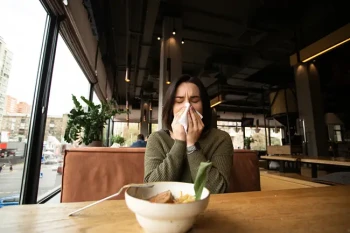
Whether you’re enjoying the Blue Ridge Parkway or venturing out to Colorado, taking in the mountains can be an awe-inspiring experience. Before you start planning your trip, you might be thinking about that sniffing, sneezing feeling that’s been following you: allergies. Do these symptoms get better when you venture into higher altitudes, or do they get worse?
How does altitude affect nasal pressure?
Being in the mountains increases your exposure to higher altitudes. As you venture further up, the air pressure decreases, which can cause your nasal lining to swell. This can lead to headaches, sinus pressure, and nasal congestion.
Can the mountains increase your likelihood of allergies?
Short answer: it depends. Based on the type of allergies you have, you may have a better or worse time during your trip. Pollen counts are typically lower in the mountains compared to lower elevations, meaning that your symptoms could be weaker. On the other hand, wind speed increases at higher altitudes, which could mean more exposure to airborne allergens.
Dr. Jonathan Moss, a CEENTA otolaryngologist at our Matthews location, advises planning your venture strategically. “A trip to the mountains can be a welcome reprieve for those suffering from spring allergies. Allergies to alpine trees are much lower than those from trees that flourish at lower elevations. Higher altitude also offers less humidity, which leads to decreased concentration of dust mites and molds. If you’re an allergy sufferer, maybe spring is the time for you to enjoy the Blue Ridge Parkway.”
What can I do to treat allergies in the mountains?
If you do experience allergy symptoms in the mountains, there are multiple remedies you can do by yourself. Staying hydrated can keep your nasal passages from drying out against the harsh winds, lower humidity, and colder temperatures. Nasal spray is always useful to have on hand, and a Neti pot can clear debris from your nose. Finally, over-the-counter antihistamines can help with many of your symptoms.
Prior to your trip to the mountains, you can get the allergy relief you need with CEENTA. Our team of allergy specialists can test you to find out what you’re allergic to along with providing treatment options that fit your lifestyle. No matter what mountain you climb, reach new heights with allergy care at CEENTA today.
This blog is for informational purposes only. For specific medical questions, please consult your doctor. New patients can make appointments online with our doctors in North and South Carolina. Current patients can also make appointments through myCEENTAchart with physicians they have already seen.
You may also be interested in

After testing has ruled out allergies, what could be causing your stuffy nose? Learn more about nonallergic rhinitis and nasal congestion.

Hear from allergy technician lead Mary Gardner discuss her fifty-year career at CEENTA, including how allergy care has changed over the decades.

Looking to add a furry friend to your family? Learn more about pet allergy symptoms and your remedies at CEENTA.
Leave a Comment
Back to News

